

The 50/30/10/10 Rule for How to Wake Up Earlier and Work on Your Dream. I am not a morning person whatsoever.

10 strategies to support students and help them learn during the coronavirus crisis (opinion) On the day when the weight deadens on your shoulders and you stumble, may the clay dance to balance you. -- John O'Donohue A few years ago, a student of mine lost his father to an unexpected illness that took a wrong turn.
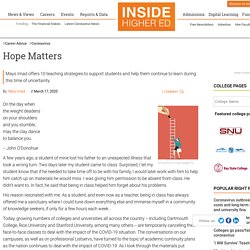
Two days later my student came to class. 10 strategies to support students and help them learn during the coronavirus crisis (opinion) Why do East-Asian international students often stay silent in class? These students are using what I call a “silent strategy” to build reputation, but this can backfire, leading to negative interpretations.

The number of international students continues to climb at Canadian universities. In 2018, Canada recorded 435,415 international students enrolled at all postsecondary education levels, an 18-percent jump from the previous year. The University of British Columbia, where I study, has 16,000 international students, comprising 26 percent of undergraduates and 36 percent of graduate students. Piecing Together the Student Success Puzzle: Research, Propositions, and ... - George D. Kuh, Jillian Kinzie, Jennifer A. Buckley, Brian K. Bridges, John C. Hayek. University of Regina Library Authentication. To verify that you are a current University of Regina user, use one of the two methods below.
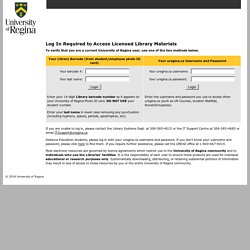
If you are unable to log in, please contact the Library Systems Dept. at 306-585-4015 or the IT Support Centre at 306-585-4685 or email IT.Support@uregina.ca. Distance Education students, please log in with your uregina.ca username and password. If you don't know your username and password, please click here to find them. If you require further assistance, please call the UREAD office at 1-800-667-6014. What universities can do to keep students from dropping out. Finances, academic performance and a sense of belonging may all be factors in whether or students finish their post-secondary studies.
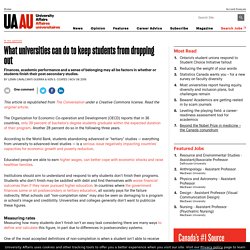
This article is republished from The Conversation under a Creative Commons license. Read the original article. The Organization for Economic Co-operation and Development (OECD) reports that in 36 countries, only 39 percent of bachelor’s degree students graduate within the expected duration of their program. Another 28 percent do so in the following three years. According to the World Bank, students abandoning advanced or “tertiary” studies — everything from university to advanced-level studies — is a serious issue negatively impacting countries’ capacities for economic growth and poverty reduction. Educated people are able to earn higher wages, can better cope with economic shocks and raise healthier families. Institutions should aim to understand and respond to why students don’t finish their programs. Measuring rates Financial costs Lower averages, belonging. How Colleges Can Best Support First-Gen Students. We need to have a candid conversation about quality undergraduate education.
There’s much to admire in Canada’s higher education system, but we can do so much better.
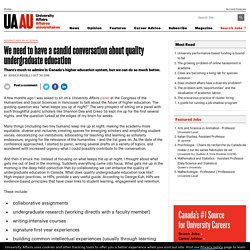
A few months ago I was asked to sit on a University Affairs panel at the Congress of the Humanities and Social Sciences in Vancouver to talk about the future of higher education. The guiding question was “what keeps you up at night?” The very prospect of sitting on a panel with such thoughtful public scholars like Shannon Dea and Creso Sá kept me up for the first several nights, and the question lurked at the edges of my brain for weeks. Many things (including two tiny humans) keep me up at night: making the academy more equitable, diverse and inclusive; creating spaces for emerging scholars and amplifying student voices; decolonizing our institutions; advocating for teaching and learning as scholarly endeavours; arguing for the relevance of the humanities – and the list goes on.
These include: Does student affairs have a diversity problem? The conversation about race in the profession is heating up.
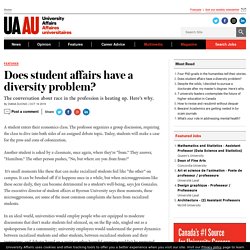
Professors' reflections on their experiences with 'ungrading' spark renewed interest in the student-centered assessment practice. The significant learning benefits of getting rid of grades (essay) For the last decade and a half, I’ve engaged in anthropological research on higher education, identifying several challenges and mismatches between what we know about learning “in real life” and learning in college.
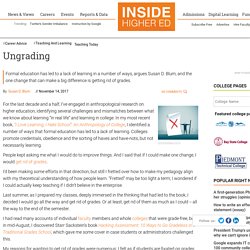
In my most recent book, “I Love Learning; I Hate School”: An Anthropology of College, I identified a number of ways that formal education has led to a lack of learning. This Is the Ideal Number of Hours to Work a Day, According to Decades of Science. 7 university leaders contemplate the future of higher education in Canada. They affirm that universities have a vital role to play in helping society navigate through the deepest challenges of our time, from climate change to the dangers of misinformation and rising intolerance.

How will Canadian universities change over the next 20 years? What challenges will they face and what opportunities lie ahead? In honour of University Affairs’ 60th anniversary, we put questions like these to seven people representing different regions and facets of the university enterprise from coast to coast. A Prominent Economist’s Death Prompts Talk of Mental Health in the Professoriate.